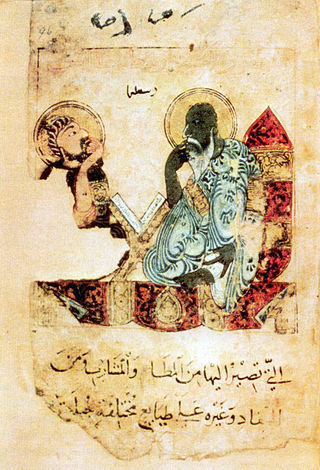
Lists of Muslim scientists and scholars cover scientists and scholars who were active in the Islamic world before the modern era. They include:

Lists of Muslim scientists and scholars cover scientists and scholars who were active in the Islamic world before the modern era. They include:
This article contains links to lists of scientists.

Islamic philosophy is philosophy that emerges from the Islamic tradition. Two terms traditionally used in the Islamic world are sometimes translated as philosophy—falsafa, which refers to philosophy as well as logic, mathematics, and physics; and Kalam, which refers to a rationalist form of Scholastic Islamic theology which includes the schools of Maturidiyah, Ashaira and Mu'tazila.
Islamic studies refers to the academic study of Islam, and generally to academic multidisciplinary "studies" programs—programs similar to others that focus on the history, texts and theologies of other religious traditions, such as Eastern Christian Studies or Jewish Studies but also fields such as —where scholars from diverse disciplines participate and exchange ideas pertaining to the particular field of study.
The Nezamiyeh or Nizamiyyah are a group of institutions of higher education established by Khwaja Nizam al-Mulk in the eleventh century in Iran. The name nizamiyyah derives from his name. Founded at the beginning of the Seljuk Empire, these Sunni Islam theological schools are considered to be the model of later Islamic universities, or schools.

Zakariyya' al-Qazwini, also known as Qazvini, born c. 1203 in Qazvin (Iran) and died 1283, was a Persian cosmographer and geographer of Arab ancestry.
This article is a list of lists of Muslims in various professions and fields.
Muslim scholars have developed a spectrum of viewpoints on science within the context of Islam. The Quran and Islam allows for much interpretation when it comes to science. Scientists of medieval Muslim civilization contributed to the new discoveries of science. From the eighth to fifteenth century, Muslim mathematicians and astronomers furthered the development of almost all areas of mathematics. At the same time, concerns have been raised about the lack of scientific literacy in parts of the modern Muslim world.

The Islamic Golden Age was a period of cultural, economic, and scientific flourishing in the history of Islam, traditionally dated from the 8th century to the 14th century. This period is traditionally understood to have begun during the reign of the Abbasid caliph Harun al-Rashid with the inauguration of the House of Wisdom in Baghdad, the world's largest city by then, where Muslim scholars and polymaths from various parts of the world with different cultural backgrounds were mandated to gather and translate all of the known world's classical knowledge into Aramaic and Arabic.
Zaynab al-Awadiya Also known as Zaynab of Banu Awd was a 7th-century Arab physician and expert oculist. She was a member of the Arab tribe of Banu Awd. As a proficient medical practitioner, she was widely renowned among the Arabs due to her expertise in treating sore eyes and wounds. Zaynab has been mentioned in different medieval Arabic books. In particular, the Kitab al-Aghani a major work of the 10th-century historian Abu al-Faraj al-Isfahani. And later in the encyclopedic work of the 13th-century physician Ibn Abi Usaibia, known as Uyūn ul-Anbāʾ fī Ṭabaqāt al-Aṭibbā
Badīʿ Al-Zaman Abu al-Qasim Hibatallah Ibn Al-Ḥusayn more commonly known as al-Badīʿ al-Asṭurlābī, was a prominent medieval Arab physician, philosopher, astronomer, and poet of the Islamic Golden Age.
Sharīf al-Dīn Abu Ali Muḥammad ibn Sana' al-Mulk As'ad ibn Ali al-Jawwani better known as Al-Jawwani, was a 12th-century Arab Egyptian historian and genealogist in Fatimid Egypt.
Abū Bakr Muḥammad ibn al-Qāsim ibn Muḥammad ibn Bashār al-Anbārī, also known simply as Ibn al-Anbari, was a well known Arab philologist and grammarian of the Abbasid Caliphate.
Abū Muḥammad al-Qāsim ibn Muḥammad ibn Bashār al-Anbārī was an influential Arab philologist of the Abbasid era.
Abū al-Qāsim Alī ibn Jaʿfar ibn Alī ibn Muḥammad al-Saʿdī, also known simply as Ibn al-Qatta' al-Siqilli was a renowned Arab philologist, lexicographer and anthologist of the Arabic language. His work is regarded as one of the major sources which preserve an abundance of knowledge about Arabic Sicilian poetry.
Ḍiyāʾ al-Dīn Abū al-Saʿādāt Hibatallāh ibn Alī simply known as Ibn al-Shajari, was a prominent Arab grammarian, philologist and poet of Arabic. Widely celebrated for his knowledge of pre-Islamic Arabic literature.
Abū ʿAbdallāh Muḥammad ibn Masʿūd ibn Ṭayyib ibn Faraj ibn Khalaṣa(or Khāliṣa) al-Ghāfiqī al-Shaquri better known as Ibn Abi'l-Khisal, was a prominent Andalusi secretary, historian, scholar of ḥadīth and poet. He is referred to as Dhu al-Wizaratayn, an honorific given to senior ministers in medieval Islamic world.
Muḥammad ibn Tamīm ibn Tamām al-Tamīmī more commonly known as Abu al-Arab was a 10th-century Arab Muslim historian, poet, traditionist and faqih of the Maliki school. His most celebrated work is Tabaqat 'Ulama Ifriqiya which include numerous scholars of his time.